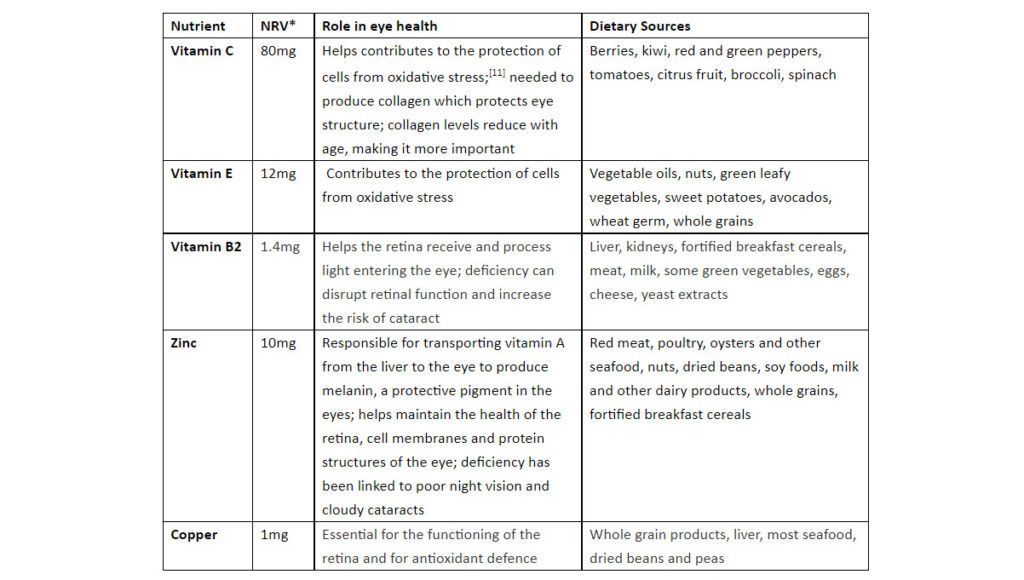
Almost three-quarters of Brits notice their eyes deteriorating with age, according to research by MacuShield, but few know how to meet their eye nutrition needs.
Seventy-three per cent[1] of Brits notice their eyes deteriorating with age, but few know how to meet their eye nutrition needs. A report has highlighted key nutrients for eye health, suggesting a role for supplements to help bridge eye nutrient gaps.[2]
With only a third of Brits achieving their 5-A-Day of fruit and vegetables, many risk falling short of nutrients for their eye health and vision, including the three macular carotenoids, B2, Vitamin C, Vitamin E, copper, zinc and omega-3 – found in foods from oysters to orange peppers and kale to kiwis.
The World Health Organization’s (WHO) World Report on Vision[3] predicted a dramatic increase in the need for eye care in the coming decades, partly due to an ageing population worldwide. This is a concern that’s backed by the findings of a new report and real-world research poll[4] of over 1,000 Brits commissioned by MacuShield, the brains behind a range of specialist eye supplements.[5]
This poll[6] reveals that almost three-quarters (73%) of those surveyed noticed a deterioration in their eyes with age. Yet, unfortunately, few appear to know that we can help ourselves by getting the right eye health nutrients in our diet and bridging gaps with appropriate eye health supplements, such as those in the MacuShield range[7].
As public health nutritionist and co-author of the report titled “SEEING IS BELIEVING: Why we all need to love our eye health”, Dr Emma Derbyshire points out, “The MacuShield survey[8] reveals a worrying lack of knowledge about how to look after our eyes throughout life. While 50% think there are things you can do for eye health, they have no idea what, and 38% have only a rough idea of what they can do, while more than one in ten (12%) think there is nothing they can do for their eye health.”
To make matters worse, the MacuShield poll[9] suggests that nearly four in ten Brits (39%) have a medical condition that impacts their vision, while the same proportion (39%) have experienced eye health problems at any age.

Patchy knowledge about eye nutrition
While a third (33%) of respondents said they ate a healthy diet and 15% took an eye health supplement, the MacuShield survey[10] revealed patchy knowledge of the impact of diet and nutrition on eye health. For example, 52% agreed that diet had some effect on eye health, and 19% thought it had a big impact. However, 10% said diet had no effect, while 19% simply had no idea.
Even those who knew about the importance of nutrition struggled to select the correct nutrients needed for healthy eye ageing. As a clinical nutritionist and report co-author, Suzie Sawyer points out: “Many nutrients have a role in eye health, in particular vitamins and minerals such as zinc, vitamin C and vitamin B2.
“Macular carotenoids like lutein, meso-zeaxanthin and zeaxanthin are found in high concentrations in the eye, too. Sadly, many of the poll respondents could not identify these key nutrients.”
Only a quarter of Brits selected vitamin B2, while 15% picked out macular carotenoids, and 13% said zinc could play a role in eye health nutrition. What’s more, an underwhelming proportion of those polled had heard of the three macular carotenoids for our eyes:
- Lutein – fewer than a fifth (18%)
- Meso-zeaxanthin – just 6%
- Zeaxanthin – only 7% have heard of this
Additionally, a majority (57%) of those surveyed didn’t know which foods contain lutein. Only 24% knew that green, leafy vegetables contain lutein. While one in six (15%) said that egg yolks are a source of lutein, this still relies on the chickens being given lutein-containing feed.
Nutrition basics for better eye health
“To combat this eye nutrient knowledge shortfall, our report lays out important eye health nutrients and where people can get them,” says leading optometrist and report co-author Francesca Marchetti, adding, “Excellent nutrition is vital for eye health at every age.”
Vitamins And Minerals Important For Eye Health

*Nutrient Reference Values (NRVs) are EU guidance levels on the daily amount of a vitamin or mineral that the average healthy person needs to stay healthy.
“Dietary advice is extremely valuable, but it can only work if people are able to follow it,” says Dr Emma Derbyshire, adding, “Only a third (33%) of adults aged 19 to 64 are achieving their 5-A-Day of fruit and vegetables, according to the UK National Diet and Nutrition Survey (NDNS[12]), meaning two-thirds of the nation could be short of nutrients including essential vitamins and minerals for eye health.
But bridging gaps with the appropriate targeted eye supplements such as those in the MacuShield range[13] may be worth considering alongside a healthy diet with at least 5 fruits and vegetables a day as well as following a healthy lifestyle.”
She goes on to specify: “Take for example MacuShield’s Original+ formula[14], this contains vitamin B2 (0.3 mg), also known as riboflavin which supports eye health, while MacuShield Gold[15] contains zinc (25mg) to maintain normal vision as well as vitamin C (500mg), vitamin E (268mg), and copper (2mg) – all great for helping to contribute to the protection of cells from oxidative stress – vital support as we age.”
Suzie Sawyer adds, “Fruit and vegetables are the main sources of lutein, one of the macular carotenoids alongside meso-zeaxanthin and zeaxanthin. The body naturally deposits the three macular carotenoids – lutein, meso-zeaxanthin and zeaxanthin – at the macula. These macular carotenoids form the macular pigment.
It’s important to note that the body cannot make these macular carotenoids. So, with relatively few of us achieving our 5-A-Day, most of us will fail to achieve the suggested 10 mg/d of lutein, along with other key eye health vitamins and minerals we get from vegetables and fruits. This is where taking an eye supplement containing these vitamins and minerals, such as those in the MacuShield range5, can help.”
The solution to our eye care worries
While we need to take our eyes seriously, the good news is there’s plenty we can do to help ourselves, and it doesn’t have to be complicated. Leading optometrist Francesca Marchetti shares her top five tips to get our nutrition and lifestyle in shape for a brighter outlook for our eyes:
Eat well. Eat a wide range of fruits and vegetables – leafy vegetables such as spinach, cavolo nero and kale, tomatoes, sweet potatoes, broccoli, courgettes and orange peppers provide the macular carotenoids lutein and zeaxanthin.
Taking a supplement, such as one from the MacuShield range,[16] may be worth considering alongside a healthy diet with at least five fruits and vegetables a day, as well as following a healthy lifestyle. See https://MacuShield.com/uk/.
Maintain a healthy weight. This is important for many health reasons, but it’s crucial to eye health, as macular pigment density is reduced in people who are obese.[17]
Exercise regularly. Regular exercise is essential to good health, and research suggests that aerobic exercise can increase crucial oxygen supplies to the eye.
Always protect your eyes from the sun. The World Health Organisation estimates that ultraviolet exposure is responsible for at least 20% of cataracts globally. UV rays age every part of the eye and are a risk factor for eye health issues that can be irreversible and may result in vision loss. Be sure to get a pair of sunglasses that offers UVA, UVB and UVC protection and wear a hat in strong sunlight.
See your optician for regular check-ups. Always wear your prescription lenses and see your optician immediately if you notice a change in your vision, as this could be an indication of other health issues.
References:
- [1] Global Perspectus Omnibus Research Poll; August 2023; 1,011 consumers questioned; data on file
- [2] MacuShield Original+, Chewable and Original+ Vegetarian contain vitamin B2, which helps to maintain normal vision. MacuShield Gold contains Zinc, which helps to maintain normal vision.
- [3] https://www.who.int/publications/i/item/9789241516570
- [4] Global Perspectus Omnibus Research Poll; August 2023; 1,011 consumers questioned; data on file
- [5] MacuShield Original+, Chewable and Original+ Vegetarian contain vitamin B2, which helps to maintain normal vision. MacuShield Gold contains Zinc, which helps to maintain normal vision.
- [6] Global Perspectus Omnibus Research Poll; August 2023; 1,011 consumers questioned; data on file
- [7] MacuShield Original+, Chewable and Original+ Vegetarian contain vitamin B2, which helps to maintain normal vision. MacuShield Gold contains Zinc, which helps to maintain normal vision.
- [8] Global Perspectus Omnibus Research Poll; August 2023; 1,011 consumers questioned; data on file
- [9] Global Perspectus Omnibus Research Poll; August 2023; 1,011 consumers questioned; data on file
- [10] Global Perspectus Omnibus Research Poll; August 2023; 1,011 consumers questioned; data on file
- [11] https://www.gov.uk/government/publications/great-britain-nutrition-and-health-claims-nhc-register
- [12] https://www.gov.uk/government/statistics/ndns-results-from-years-9-to-11-2016-to-2017-and-2018-to-2019
- [13] MacuShield Original+, Chewable and Original+ Vegetarian contain vitamin B2, which helps to maintain normal vision. MacuShield Gold contains Zinc, which helps to maintain normal vision.
- [14] MacuShield Original+, Chewable and Original+ Vegetarian contain vitamin B2, which helps to maintain normal vision.
- [15] MacuShield Gold contains Zinc, which helps to maintain normal vision.
- [16] MacuShield Original+, Chewable and Original+ Vegetarian contain vitamin B2, which helps to maintain normal vision. MacuShield Gold contains Zinc, which helps to maintain normal vision.
- [17] Hammond, B. R., Jr, Ciulla, T. A., & Snodderly, D. M. (2002). Macular pigment density is reduced in obese subjects. Investigative ophthalmology & visual science, 43(1), 47–50.





You must be logged in to post a comment.